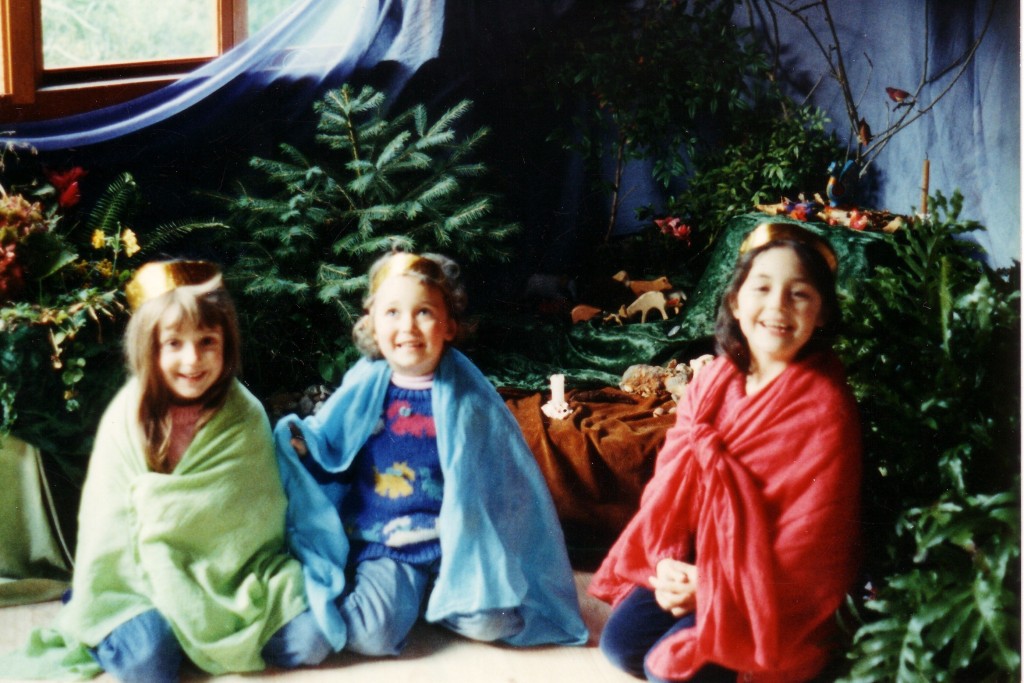
Do you sometimes wish for a more meaningful, a more sane, and a more sustainable Christmas with your children?
It is easy for Christmas to become a stressful event, dictated by commercial interests, family expectations and outdated traditions. Yet we can take Christmas back to make it a beautiful time, appropriate for our own family and our children’s needs. Here are some thoughts on how to do that.
Making Christmas more meaningful
Christmas is fast becoming a universal celebration for families, penetrating even non Christian countries. Christians have much to celebrate in it, but people of all beliefs can make it a more meaningful time for their families. Christmas can simply be a celebration of love. Children also love the universal story of the nativity, where a special child is welcomed by a special star, the angels, the humble shepherds and the noble wise kings. Whether that Christmas child is the Saviour, or a prophet or a symbol for each child, it is a therapeutic story for the loving welcome every child would wish for. Christmas has a lot to offer families, for building good memories about love and belonging which can sustain them through their lives.
In making Christmas meaningful for your family it is helpful to consider what you value. Love, kindness, caring, thoughtfulness of others, family, friends, strangers, creativity? Christmas is a time you can build pictures of these values for your children, and create your own family traditions to be repeated and confirmed each passing year. You can find your own meaning in the symbols of Christmas. For example:
- Presents, especially “love gifts”, can show care and gratitude for each other and those in our community who have helped us, like teachers and neighbours. (See: http://www.creativelivingwithchildren.com/nurturing-childrens-growth-2/play/love-gifts/ )
- The Christmas tree and Christmas lights can be symbols of our supportive love circle, of all those people we love and love us, wherever they might be. We can make family celebrations out of times to mark the putting up of the tree, or lighting candles for those we love around it, etc. (See: http://www.creativelivingwithchildren.com/nurturing-childrens-growth-2/enriching-life-with-children/family-celebrations/ )
- The food. A celebratory meal together builds a sense of community. The food we share at Christmas can build our family tradition and associations with our chosen values.
- Stories. The stories you tell your children around Christmas can be invaluable for illustrating your values. Christians have many stories to tell but there are also many other stories which can model the values we want to share at Christmas about love, care for others, generosity, compassion, willingness to give of ourselves, the circularity of giving– how our own generosity can come back to us in unexpected ways.
Making Christmas more sane
Children and adults alike can find Christmas very stressful. As adults we need to decide how we want to simplify Christmas to suit our own circumstances and family.
While Christmas is exciting for children, it is often overwhelming, especially for small children, because so much happens all at once, on one day. Their stress is often exacerbated by our own stress at Christmas. There are many ways to manage this differently. For example, we can take the pressure off Christmas Day by spreading the activities over time, in more digestible bites:
- In celebrating the four weeks of advent, we can lead children more slowly towards Christmas, with stories, songs, making presents, and activities emphasizing love and care for each other. It can bring a certain order to the chaos.
- We can celebrate Christmas Eve as a quiet, more inward special time, for a story, candle lighting time, gentle singing around the Christmas tree before bed.
- We can celebrate the 12 days of Christmas to give ourselves permission to spread out over days the social events, and even the present giving, instead of trying to cram everyone and everything into one day. This can legitimise taking time for things at Christmas.
This restructuring will not work for everyone but is worth considering. More on sanity saving strategies for Christmas and cutting down on stress can be found here. http://www.creativelivingwithchildren.com/nurturing-childrens-growth-2/enriching-life-with-children/sanity-saving-strategies-for-christmas/
Sustainability and common sense at Christmas
Christmas for many has become a pressure to be excessive, in food, presents, entertainment. You can ask, is that you what you want, is it what your children need, or do you want to do some things differently?
Many families are choosing a different approach to giving presents. Some are limiting the number of presents, or giving presents only to children. Some are choosing to give a group present to a NGO working in a poor country, like the present of a goat to a poor family somewhere. It is worth avoiding giving cheap unwanted presents of inferior quality and choosing instead fewer quality items that last and are wanted and useful, to support a more sustainable world. What do we want to model for our children here? To help our friends and relatives to also make wiser choices for presents for our children there are suggestions here: http://www.creativelivingwithchildren.com/nurturing-childrens-growth-2/play/possible-presents-list/
More sustainable celebration can also be considered in food. What can we model for our children here too? Can we show that we care about throw away plastic utensils and use only paper or bamboo, or commit ourselves to washing up together as our Christmas gift to the earth this year (this may need an agreement about ‘those who don’t cook/prepare, wash up as their contribution’)? Can we cut down on excess food, to teach our children about quality eating experiences rather than succumbing to the temptation of excess eating? Can we choose quality seasonal food, locally grown or made, from sustainable fisheries and agriculture. Those who have a southern summer Christmas can easily feast very, very well on such fresh local produce. Those whose Christmas is in the cold northern hemisphere areas may find this more challenging in winter.
While you probably can’t do all of this at once, in doing even some of it you will be modelling for your children how to bring more meaning, common sense and sustainability into Christmas and your lives. And you will be making your Christmas your own.
